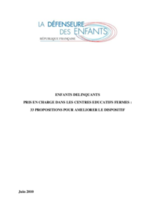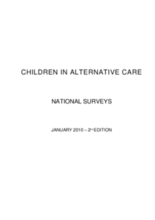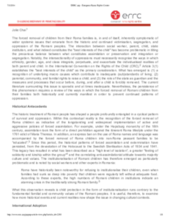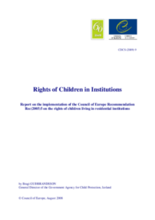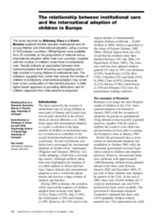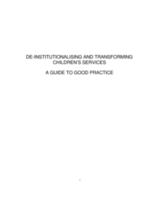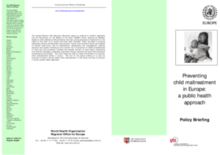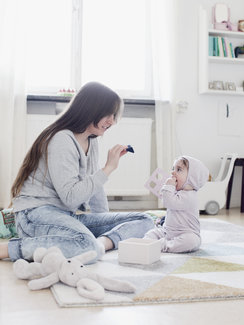

Displaying 221 - 230 of 237
Dans le cadre des démarches engagées par le Gouvernement francais depuis quelques années sur la question de la réforme de l’ordonnance du 2 février 1945 relative à l’enfance délinquante, la Défenseure des enfants a eu régulièrement à s’exprimer sur les questions juridiques et humaines posées par la procédure et le droit pénal.La Défenseure des enfants a souhaité débuter une réflexion approfondie sur la situation en France des enfants en conflit avec la loi dans le cadre des différentes prises en charge qui leur sont proposées.
This book features individual empirical studies on the outcomes and progress made for children in foster care around the world.
In 2009 Eurochild carried out a survey of the situation of children in alternative care in Europe through its member organisations. The survey was not intended as a scientifically rigorous research exercise but rather to identify what information is readily available and to note some common trends across Europe.
Explores particular vulnerabilities that arise for Roma children and families in regards to care as a result of social marginalization
This report provides an assessment of the current situation with regards to rights of children in institutions in 42 Council of Europe member states.
In this meta-analysis of 75 studies on more than 3,888 children in 19 different countries, the intellectual development of children living in children's homes (orphanages) was compared with that of children living with their (foster) families.
Explores causal relationship between increased international adoption and increase in institutional care of children in Europe.
The study reported by Shihning Chou and Kevin Browne explored the link between institutional care for young children and international adoption, using a survey of 33 European countries. The evidence suggests that, rather than reduce the number of children in institutions, international adoption may contribute to the continuation of this harmful practice. A child rights-based approach to providing alternative care for children separated from their parents is proposed.
A clear, concise, and evidence-based summary of the effects of institutional care on children. Identifies key steps to transforming children's services to promote alternative care. Links to training resources at European Union Daphne Project website.
Addresses prevention of child maltreatment in the family through a public health approach. Identifies primary, secondary, and tertiary prevention strategies and sets proirities for action.

